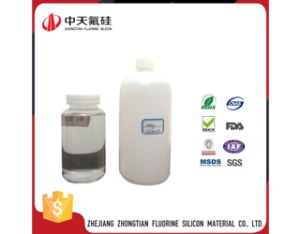Silicone fluids have unique properties because they are not products of petroleum or organic chemistry. They were the first, and are still the only, major class of polymers that are products of inorganic chemistry.
Zhongtian Silicone Fluid Product Series
Among the whole products series, the silicone fluid product series launched by Zhongtian as the silicone products manufacturer is also worth a look. As liquid silicone rubber manufacturers, we offer high-quality polydimethylsiloxane and the best silicone oil that can be directly used in the damp proof, insulation, damping, shock absorption, defoaming, lubrication, polishing, etc.
Polydimethylsiloxane
Soluble in benzene, toluene, ethylene, ethyl ether, partially soluble in ethanol, butanol, acetone, insoluble in cyclohexanol, paraffin oil, vegetable oil and methanol.
Silicone Fluid Properties
Generally speaking, silicone fluid is colorless (or light yellow), tasteless, non-toxic, non-volatile liquid. Silicone fluid has the following special properties:
· high and low-temperature resistance
· electrical insulation
· weather resistance
· physiological inertia and small surface tension
· no corrosion to metal
· good insulation
Due to these properties, liquid silicone oil enjoys excellent effect in many aspects. Among all kinds of silicone oil, methyl silicone oil is the most widely used and the most important one
Silicone Fluid Application
The application of silicone fluid is now extending to the following fields r industries:
· Nano components: microflow channel, micromixer, micro pump, microvalve, etc.
· Body filling: breast filling
· Aerospace: protective coating of surfaces
Description of Silicone Fluid
Silicone fluid usually refers to a linear polysiloxane product that remains liquid at room temperature. It is generally divided into two categories: methyl silicone fluid and modified silicone fluid. The most commonly used silicone fluid - methyl silicone fluid, also known as ordinary silicone fluid, whose organic groups are all methyl, methyl silicone fluid has good chemical stability, insulation, and good hydrophobic properties. It is made by hydrolysis of dimethyl dichlorosilane with water to make the initial condensation ring body, the ring body by cracking, distillation to make a low ring body, and then the ring body, capping agent, catalyst put together to adjust the polymerization can get a variety of different polymerization degree of the mixture, by reducing the distillation to remove the low boiling material can be made of silicone fluid.
Advantages and Disadvantages of Silicone Fluid
Advantages
(1) The viscosity and temperature performance is the best among liquid lubricants, and the viscosity changes little in wide temperature range. Its freezing point is generally less than -50℃, some are as high as -70℃, and its oil appearance and viscosity do not change when stored for a long time at low temperature, it is a base oil that can take into account high temperature, low temperature and wide temperature range.
(2) Excellent thermal oxidation stability, such as thermal decomposition temperature >300℃, small evaporation loss (150℃, 30 days, evaporation loss is only 2%), oxidation test (200℃, 72h), small changes in viscosity and acid value.
(3) excellent electrical insulation, volume resistance, etc. does not change in the range of room temperature ~ 130 ℃ (but the oil can not contain water).
(4) It is a non-toxic and low foaming, strong anti-foaming oil, can be used as antifoaming agent, etc.
(5) Excellent shear stability, has the function of absorbing vibration and preventing vibration transmission, and can be used as vibration damping fluid.
Disadvantages
(1) The lubricity of silicone oil is not good, especially for the poor lubrication of the steel friction side.
(2) The coefficient of thermal expansion of silicone oil is large (may produce overpressure problem).
(3) Large gas solubility (difficult to design gas sealing device).
(4) A certain degree of hygroscopicity (after the water content is higher than 100×10-6, the electrical performance drops sharply).
(5) Small surface tension (easy to leak from the machine).
Harm to Human Body of Silicone Fluid
Silicone fluid was used as an implant product for women's breast enlargement. After being used for more than forty years, silicone fluid was banned in Europe and the United States in the early nineties after it was found to cause a decrease in the body's immune function or cause cancer. At that time, the company that produced silicone gel implants in the United States was sued and lost a lot of money. In the last two years, silicone oil was again opened for use in Europe because of the discovery that the causes of cancer in women who had breast enlargement were more complex, but it is still banned in the United States.
Some silicone oil-based products can be slightly corrosive and more care should be taken during transportation and production.
Hydrogen Silicone Oil Overview
Hydrogen silicone oil, under the action of the metal catalyst, can be cross-linked at the appropriate temperature, forming a waterproof film on the surface of various substrates. Hydrogen silicone oil is widely used as a water repellent, anti-adhesive or anti-corrosion agent for fabric, fire extinguishing agent (dry powder), paper, metal, leather, wood, glass, cement, ceramics, marble, etc.
Performance and Applications of Hydrogen Silicone Oil
Hydrogen silicone oil has particularly good hydrophobicity, suitable for many occasions such as surface treatment of glass, metal, fiber, and powder. Hydrogen silicone oil can be used as a waterproofing agent for fabrics, glass, ceramics, paper, leather, metal, cement, marble, and other materials, especially for fabrics. Methyl hydrogen silicone oil emulsion and methyl hydroxyl silicone oil emulsion share can waterproof and keep the breathability of the fabric and can improve the tear strength, abrasion strength, and stain resistance of the fabric, improve the feel of the fabric and sewing performance. In addition, hydrogen silicone oil can be used as an anti-adhesive isolating agent and cross-linking agent for paper.
1. Solid silicone rubber - high temperature blending silicone rubber (HTV) to do bridging agent, anti-yellowing agent, coupling agent
2. As a cross-linking agent for liquid silicone rubber, forming Si-C bond under the catalytic effect of pt
3. Hydrogen silicone oil can be used as a water repellent agent (water repellent agent, water repellent agent) in waterproof clothing and waterproof plasterboard, under the action of metal salt catalyst, it can be cross-linked at low temperature to form a waterproof film on the surface.
4. In the MgO (electrical grade MgO) surface treatment, play an insulating role
5. Hydrogen silicone oil can be used in the textile and garment industry as a softener, water repellent, hand feeling improvement agent, lubrication of sewing line, lubrication of chemical fiber spinneret and garment pressure lining auxiliaries, etc.
Packaging and Storage of Hydrogen Silicone Oil
Hydrogen silicone oil should avoid contact with alkaline substances, acid-proof, moisture-proof, stored in a cool and dry place, the storage period of more than one year. Over the period it can be retested if it is standard qualified, hydrogen silicone oil can still be used. Hydrogen silicone oil is the non-dangerous product.
Localisation : No.20 Huayin North Road, High-tech Industrial Park, Quzhou, Zhejiang,China, 324004 No.20 Huayin North Road, High-tech Industrial Park, Quzhou, Zhejiang,China,
Personne à contacter : Cheng Doris, 05708598517








